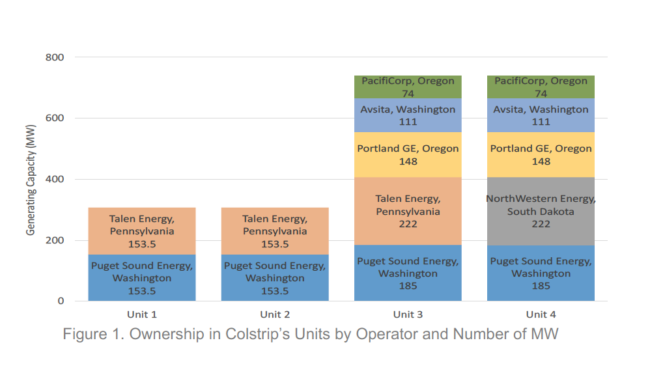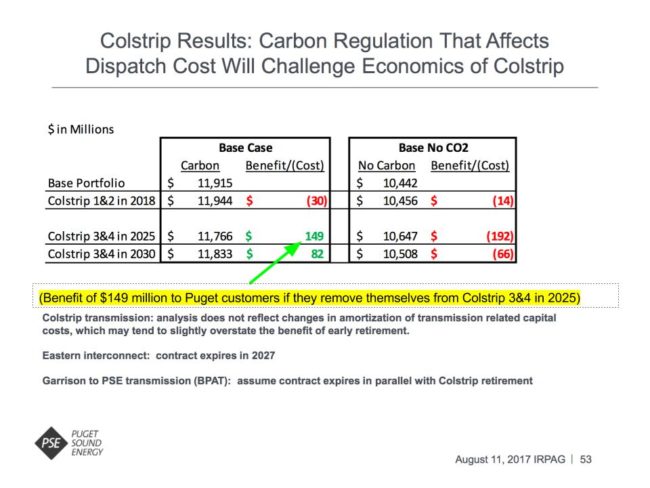by Anne Hedges, September 19, 2017
The Colstrip plant will only be “useful” until 2027. That’s according to an agreement filed last week in the Puget Sound Energy (Puget) rate case in Washington. In the agreement, the parties agreed that the Colstrip plant only had 10 years remaining of useful life for Puget. In the utility world, that’s a big deal. The Washington utilities commission will ultimately decide whether to accept the agreement, but the agreement spells the beginning of the end for the plant.
Puget has the largest ownership share of the Colstrip plant. Puget helped build Colstrip back in the 1970’s and owns half of units 1 & 2 and 25% of the larger units 3 & 4, for a total of about 677 megawatts of the 2,200 megawatt plant. MEIC and Sierra Club reached an agreement last year with the owners to close units 1 &2 in 2022 based on concerns over air quality. The Puget settlement in Washington last week is the first time an owner of the Colstrip plant has publicly said the end of the useful life of the entire plant is within a decade. No other owner is as important when it comes to deciding the future of Colstrip, and so the agreement is a critical milestone.

The ownership structure of Colstrip, included in the July 2017 report “Colstrip: The Status of Key Policies and Decision Processes,” available at: https://headwaterseconomics.org/wp-content/uploads/Colstrip_Status_Report.pdf
In the settlement the parties also agreed to a number of other critical provisions to help Montana and the Colstrip area:
- Establishment of a $10 million community transition fund, with half of the money coming from Puget’s shareholders and the other half from Washington electricity customers. That money will be put into an escrow account that can be used once a transition plan is finalized. A transition plan should include such things as workforce retraining, displaced worker prioritization for remediation jobs, clean energy replacement, cleanup costs, etc.
- Establishment of a cleanup fund. 2016 Washington legislation – that Montana legislators opposed for unknown reasons – required Puget to set aside money to clean-up the 800 acres (over one square mile) of leaking coal ash impoundments in and around the Colstrip plant that have contaminated the ground and surface water. One estimate shows the cleanup fund will be eventually worth about $380 million. The settlement provides the details for establishment and use of that fund.
- Creation of process to determine how to repurpose the transmission system out of Colstrip. The large transmission line that moves energy from Colstrip to west coast markets is a goose that lays golden eggs for eastern Montana. The Colstrip area has great wind potential, along with terrific opportunities for geothermal and solar energy development. Those resources, combined with energy storage opportunities, could provide clean energy that is in high demand by west coast markets as well as important economic development opportunities for Montana. This settlement helps move that process forward.
- Transparency. Each year Puget will provide important information to the Washington utilities commission. The annual update will provide Puget’s latest retirement dates for all four units and estimated cleanup and decommissioning costs, among other things.
Some in Montana will argue that Puget’s customers are going to see skyrocketing electric bills if the plant closes by 2027. The truth is very different. Puget recently released a planning document in which it shows that closing units 3 & 4 in 2025 would save its electricity customers a whopping $149 million! That’s not chump change.

Graph from a presentation to Puget’s 2017 Integrated Resource Planning advisory group, available here: https://pse.com/aboutpse/EnergySupply/Documents/01_PSE_2017_IRPAG_DRAFT_August%2011_2017_UPDATED.pdf
The other Colstrip owners have depreciation dates for units 3 & 4 ranging from 2030 to 2047. None of them have publicly established a fund for cleanup and decommissioning. None of them have agreed to establish a transition fund to help the community and local governments move beyond coal. Now that the largest owner has established the remaining useful life of the plant, as well as a transition fund, annual reporting, and transmission system planning, it’s time for the other owners to behave responsibly, including Montana’s own NorthWestern Energy.
The Washington Utilities & Transportation Commission must now decide whether to accept the agreement, reached by such diverse parties as Puget Sound Energy, the Washington utility commission staff, Sierra Club, Renewable Northwest, NW Energy Coalition, Natural Resources Defense Council, Washington industrial users, low-income advocates, and many others, including Montana Attorney General Tim Fox. Let’s hope the Commission accepts the agreement and Montana can move forward with planning for a just and economically beneficial transition to clean energy.

